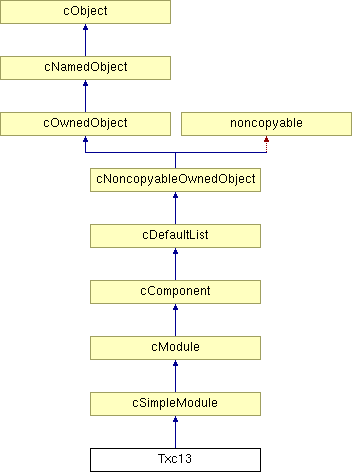Txc13 Class Reference

Protected Member Functions | |
| virtual TicTocMsg13 * | generateMessage () |
| virtual void | forwardMessage (TicTocMsg13 *msg) |
| virtual void | initialize () |
| virtual void | handleMessage (cMessage *msg) |
Detailed Description
In this step the destination address is no longer node 2 -- we draw a random destination, and we'll add the destination address to the message.
The best way is to subclass cMessage and add destination as a data member. Hand-coding the message class is usually tiresome because it contains a lot of boilerplate code, so we let OMNeT++ generate the class for us. The message class specification is in tictoc13.msg -- tictoc13_m.h and .cc will be generated from this file automatically.
To make the model execute longer, after a message arrives to its destination the destination node will generate another message with a random destination address, and so forth.
Member Function Documentation
| void Txc13::forwardMessage | ( | TicTocMsg13 * | msg | ) | [protected, virtual] |
Referenced by handleMessage().
00101 { 00102 // Increment hop count. 00103 msg->setHopCount(msg->getHopCount()+1); 00104 00105 // Same routing as before: random gate. 00106 int n = gateSize("gate"); 00107 int k = intuniform(0,n-1); 00108 00109 EV << "Forwarding message " << msg << " on gate[" << k << "]\n"; 00110 send(msg, "gate$o", k); 00111 }
| TicTocMsg13 * Txc13::generateMessage | ( | ) | [protected, virtual] |
Referenced by handleMessage(), and initialize().
00083 { 00084 // Produce source and destination addresses. 00085 int src = getIndex(); // our module index 00086 int n = size(); // module vector size 00087 int dest = intuniform(0,n-2); 00088 if (dest>=src) dest++; 00089 00090 char msgname[20]; 00091 sprintf(msgname, "tic-%d-to-%d", src, dest); 00092 00093 // Create message object and set source and destination field. 00094 TicTocMsg13 *msg = new TicTocMsg13(msgname); 00095 msg->setSource(src); 00096 msg->setDestination(dest); 00097 return msg; 00098 }
| void Txc13::handleMessage | ( | cMessage * | msg | ) | [protected, virtual] |
Reimplemented from cSimpleModule.
00059 { 00060 TicTocMsg13 *ttmsg = check_and_cast<TicTocMsg13 *>(msg); 00061 00062 if (ttmsg->getDestination()==getIndex()) 00063 { 00064 // Message arrived. 00065 EV << "Message " << ttmsg << " arrived after " << ttmsg->getHopCount() << " hops.\n"; 00066 bubble("ARRIVED, starting new one!"); 00067 delete ttmsg; 00068 00069 // Generate another one. 00070 EV << "Generating another message: "; 00071 TicTocMsg13 *newmsg = generateMessage(); 00072 EV << newmsg << endl; 00073 forwardMessage(newmsg); 00074 } 00075 else 00076 { 00077 // We need to forward the message. 00078 forwardMessage(ttmsg); 00079 } 00080 }
| void Txc13::initialize | ( | ) | [protected, virtual] |
Reimplemented from cComponent.
00048 { 00049 // Module 0 sends the first message 00050 if (getIndex()==0) 00051 { 00052 // Boot the process scheduling the initial message as a self-message. 00053 TicTocMsg13 *msg = generateMessage(); 00054 scheduleAt(0.0, msg); 00055 } 00056 }
The documentation for this class was generated from the following file:
 1.6.3
1.6.3